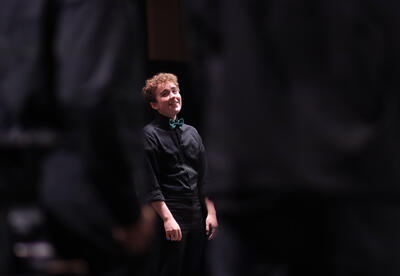
Special Education at 91¡Èâ«ç¥¤§ High
This page contains information on Special Education instruction at 91¡Èâ«ç¥¤§ High. If you have any questions please contact:

Director of Special Education

Assistant Director of Secondary Special Education

CSE Chairperson & Administrator
Special Education services
Students who have a disability that adversely impacts their learning may qualify for an Individualized Education Plan (IEP). The IEP describes the student’s educational strengths and needs related to the disability. It also outlines the special education program, related service(s), IEP goals, assistive technology needs, and program and testing accommodations. 91¡Èâ«ç¥¤§ High School offers a continuum of special education services for students with disabilities.
Students with disabilities may be recommended for related services (counseling, speech therapy, occupational therapy, physical therapy, etc.). Related services may be provided within the general education classroom, in a special education classroom, or in a therapy room. Related services may be individual or group.
Transition coordination is a direct service available that focuses on improving the academic and functional achievement of students with disabilities and facilitates the transition from high school to post-secondary. Transition services include orientation and referral to adult/post-secondary services such as care management, ACCES-VR (vocational and rehabilitation services), New York State Office of People with Developmental Disabilities, and support services on college campuses.
Special Education programs
Grades 9-12 (1 credit per core class)
This program is provided as a direct and/or indirect service to students with disabilities. Direct consultant teacher services are provided to the student. Indirect consultant teacher services are provided by the special education teacher to general education teachers. The general education teacher and the special education teacher collaborate to provide specially designed instruction. Students in this program are fulfilling requirements to earn a Local or Regents Diploma.
This service is provided outside of the general education general education classroom and consists of a special education teacher working with a group of students to address their IEP goals. Instructional groups consist of a maximum of five students and occur at a minimum of three hours weekly. Students in this program are fulfilling requirements to earn a Local or Regents Diploma.
Grades 9-12 (1 credit per core class)
This program is designed for students who require specially designed instruction to support them in achieving the grade-level curriculum and state learning standards. Students in the integrated co-teaching classroom receive instruction from both a general education teacher and a special education teacher who plan, deliver, and differentiate instruction for all students. Students in this program are fulfilling requirements to earn a Local or Regents Diploma.
Grades 9-12 (1 credit per core class)
This program is designed for students who require specially designed instruction to support them in achieving the grade-level curriculum and state learning standards. Students in a special class program receive instruction in a smaller classroom ratio as determined by an Individualized Education Plan (IEP). Instruction is designed to support and improve student skills in core subjects. Students in this program are fulfilling requirements to earn a Local or Regents Diploma.
This program is designed for students who present with reading skill deficits. This is a blended learning environment in which the students work in an online reading program, Lexia Power Up Literacy, paired with personalized teacher-led lessons in the areas of Grammar, Word Study and Comprehension. Ongoing data is used to target lessons to specific skill deficits. Emphasis is placed on developing reading skills in a structured, sequential manner using relevant and age appropriate text. Progress is monitored in both usage in Lexia as well as specific IEP goals. Weekly conferences with students provide feedback and support to identify strengths and weaknesses and encourage student ownership in the learning process.
This program provides services to students with disabilities working to develop the vocational and social skills necessary to maximize independence in work, home, and the community. Students participate in functional academic coursework in the area of Reading, Math, Science and Social Studies. They also access the PAES Lab (Practical Assessment Explorations System) which is a career training program that offers simulated work experiences for students to learn job skills, develop appropriate work behaviors, engage in vocational assessments, and more. These students are eligible for the New York State Alternate Assessment (NYSAA) and are fulfilling requirements to earn a Skills Achievement Commencement Credential (SACC).
The College-Based Transition Program is an adult program for students ages 18-21 who have received the Skills Achievement Commencement Credential (SACC). Students learn functional academics, audit college courses, and volunteer at a variety of potential employment sites on the Sage College of 91¡Èâ«ç¥¤§ campus. Students work on increasing independence by improving social, communication, employability and self-advocacy skills.
This course is designed for students who are working towards a CDOS as their only exiting credential. Students work on developing vocational skills (conducting a job search, resume writing, interviewing, etc.) and participate in coursework including Occupational Math, CDOS, English, Government & Community, and Community Work Experience. Eligible students are placed at community job sites with minimal assistance from a job coach. The 15:1:1 CDOS special class program emphasizes functional academics, independent living, vocational training, and daily living skills.





